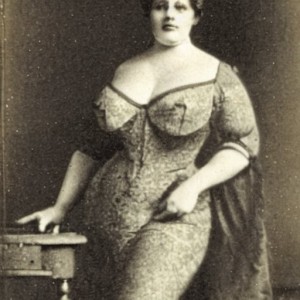Created in late 1879, especially for the collection of Les Soirées de Médan («Evenings at Médan»), Boule de Suif («Ball of Fat») has become one of the most famous short stories by Guy de Maupassant. Here the author conveys the real picture of the events of the Franco-Prussian War, the people, who participated in it on both sides, their feelings, thoughts and actions with inimitable skill.
The novel tells about a group of French residents of Rouen, whose city has been surrendered by the French army in favor of the Prussian winners. Patriotic and, at the same time, frightened citizens were not able to endure everyday co-existence next to enemies and decided to leave the city, they were going to settle in the place, where there weren’t any German man — in the far corner of France and England. Among the fugitives there were people, belonging to different orders: counts, manufacturers, wine merchants, nuns, one democrat and one woman of easy virtue, called Boule de Suif. The main plot of the novel concentrates on the last person. Boule de Suif (real name of the girl Elizabeth Rousset) turns out the «litmus paper» with help of which the true nature of all the heroes of the story becomes uncovered.
Composition «Boule de Suif» — classic in the genre of the novel. Exposition is the scene of the retreat of the French army and the occupation of Rouen by Prussian soldiers. The plot of the story comes at the moment, when the main characters are sitting in the carriage, and detecting among them a prostitute from Rouen. Negative attitude to this woman is little by little replaced by their animal hunger and gratitude to her, as to the person, who has feed them.Common trouble makes the passengers closer and sincere patriotism of Elizabeth Rousset conciliates them with her type of work.
The culmination of the novel happens in Tote, where the Prussian officer detains them, demanding intimate services from Boule de Suif day in and day out.Frightened by the delay, peaceful female fellow travelers begin to show their irritation. Respectable, at first sight, people refuse to understand, why a prostitute can not discharge her professional obligations and help all of them out of the unpleasant situation, which has been happened through her own fault. Yielding to the persuasion, Boule de Suif is ridiculed by everybody at the time of her intimacy with the Prussian officer. As soon as the woman performs her task, criticism of the society culminates and people turn away from her, as from a leper. The sad denouement is accompanied with bitter tears of the woman and the patriotic sounds of the «Marseillaise».
The character of Elizabeth Rousset — one of the most colorful in the novel. In spite of her «profession», she shows herself like a kind human (she generously shares food with all the passengers of the coach, visits the christening of unknown child), patriotic (Boule de Suif nearly strangles a German soldier and then leave Rouen, refuses to make love with Cornudet, being in the same house with the enemy), self-denying (she agrees to sacrifice not only her body, but also moral principles for the rescue of the society, and spends the night with the Prussian officer).
Wine merchant Loiseau is shown like skillful business man in the novel (he manages to come to the agreement about the supply of his wine with the owner of the inn in Tote, while everybody worries about the long delay and possible troubles) and old fox, who likes to poke his nose into everything (Loiseau spies upon Boule de Suif, when she is refusing Cornudet) and moved by his principles to satisfy the wallet and the body (he wheedles Boule de Suif to get the desired food).
Democrat Cornudet is a patriot only by word of mouth. All his fight with the enemy is digging of the trenches and only until the enemy appears on the scene.Cornudet is free from social prejudices, a little dissolute, but honest at the same time. Only he has enough courage to call his fellow travelers scoundrels for the pressure that leads Boule de Suif to the bed of the Prussian officer.
Respectable women — Comtesse of Bréville, factory-owner Carré-Lamadon and wife of wine merchant Loiseau — observe moral standards only outwardly. As soon as Boule de Suif went upstairs to the bedroom of one man, they were happy to discuss the intimate process, cracking so «greasy» jokes about this act as their husbands. Two nuns in the story also have not special moral qualities — they persuade Boule de Suif along with other people to do one of the most unseemly, religiously, act.
The important artistic features of the novels are realistic descriptions of people, characters, landscapes, objects, events. All of them are full of details taken from the real life and are written with a very lively and picturesque language.
